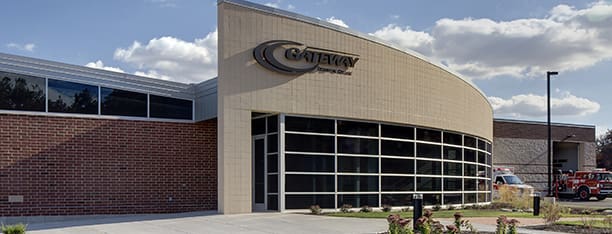By Tom Still
KENOSHA, Wis. – In southeast Wisconsin these days, jokes Bryan Albrecht, “orange is the new green.”
Albrecht, the president of Gateway Technical College, is referring to the massive amount of construction about to get under way in and around the Racine County town of Mount Pleasant, the new North American home to Foxconn Technology Group.
The largest foreign direct investment project in U.S. history will span hundreds of acres, thousands of tons of concrete and steel, and years of construction work as the plant takes shape along the I-94 corridor connecting Milwaukee and Chicago.
It will also employ thousands of production and technical workers over time, which is where Albrecht and 107-year-old Gateway Tech enter the picture.
“Our plan is to make sure our communities are ready and our students are prepared,” Albrecht told a gathering of Wisconsin tech and business leaders Tuesday in Kenosha, home to Gateway’s largest campus.

The campus is primed to do so, with a tradition that helps to explain why Foxconn picked Wisconsin as the home for the first liquid crystal display plant outside Asia. With roots dating to 1911, Gateway Technical College has the oldest college apprenticeship program in the nation and represents the birthplace of technical education in Wisconsin.
As Albrecht noted, however, “that’s history… we’re about the future,” and the campus has impressive current experience.
Gateway offers its students about 200 industry certifications and holds 160 training contracts with about 600 other colleges nationwide and beyond, meaning the college is adept at “training the trainers.” It also has dozens of industry relationships with companies that include Modine Manufacturing, Kenall, Snap-on, InSinkErator, Amazon, Trane and S.C. Johnson.
One of the latest additions is Foxconn, which signed an offer of program support with Gateway in January. The deal describes Gateway as a “strategic partner” in establishing a talent pipeline for its hiring needs over time. The first two training programs would be advanced manufacturing technology and supply chain management, likely to be followed by security infrastructure technicians and data analytics specialists.
Foxconn’s offer does not promise jobs to Gateway graduates but says graduates of Gateway or similar programs at Gateway’s partner technical colleges “will be considered as candidates for hire.”
In the largest sense, Albrecht said, the campus will train people who can work within the “Internet of Things” – a phrase the describes making devices and machines talk to other devices and machines.
An older but related field is “mechatronics,” which is mechanical and engineering systems that interface with information technology. Examples include computer numerical controlled mills and lathes, industrial robots, presses and pumps. Data collected via the “Internet of Things” can help workers predict maintenance, monitor performance, adjust processes and improve efficiencies.
“This is a great opportunity to advance our programs and to bring new skill sets to our students with the automation and robotics that are shaping ‘smart manufacturing’ today,” Albrecht said.
Gateway is not the only Wisconsin college or university with ties into Foxconn as it looks to fill 13,000 jobs over the next decade or so. In southeast Wisconsin, UW-Parkside and Carthage College have also been part of the planning. Gateway itself has campuses or centers in Kenosha, Racine and Walworth counties.
In the Milwaukee area, the Regional Talent Partnership linked to the Metropolitan Area Chamber of Commerce has engaged UW-Milwaukee, Marquette University, the Milwaukee School of Engineering and other schools in meeting the demand for workers of all descriptions.
A sign of outreach to the larger UW System was evident Wednesday at the 15th “Research in the Rotunda” in the state Capitol, where students and faculty from across the public system gathered to display undergraduate research projects from a mix of disciplines. A representative of Foxconn described how the company wants to sponsor a campus “smart cities” competition this year to encourage more undergraduate ideas.
Physically closest to the action will be Gateway, where a tradition of industry partnership will continue as the Foxconn build-out begins.
“Connecting to our historical roots is very important to us,” Albrecht told the directors of the Wisconsin Technology Council. “Working toward the future is even more so.”
Still is president of the Wisconsin Technology Council. He is the former associate editor of the Wisconsin State Journal.


